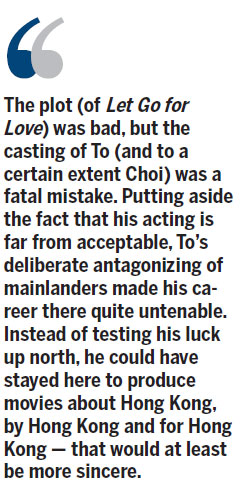To gives best example of 'no zuo no die'
Updated: 2014-05-09 05:18
By Jony Lam(HK Edition)
|
|||||||||
Few in Hong Kong know what "no zuo no die" means. The Urban Dictionary explains the phrase as: If you do stupid things, you will be bitten in the ass.
Sayings like these are popular not only in their original Chinese version, they have also made an impact internationally.
"No zuo no die" is the Chinglish expression of the phrase buzuo buhuisi. The recent inclusion of these Chinglish phrases into the Urban Dictionary, a web-based dictionary of slang words and phrases, has created a lot of fuss in the media. Our fellow countrymen certainly see it as a sign of our growing cultural influence, or soft power. Others may look at it with apprehension, especially when it coincides with the projection that China's economy may overtake the US's this year in terms of purchasing power parity.
The word zuo, pronounced in the first tone in pinyin, has its origin in Chinese dialects. While it is difficult to pinpoint the equivalent of zuo in English, the Urban Dictionary did a reasonable job translating it as "act silly or daring (for attention)." The word is used in this particular sense in quite a number of dialects - noticeably Shanghainese.
The best way to explain zuo in all its subtlety is by way of concrete examples. This is where our city comes into play, as it is full of people who fit the word zuo to a tee. While Hongkongers may not know what zuo means, a lot of them are certainly acting in such a manner.
The best example is no doubt provided by actor Chapman To Man-chak, whose aggressive online posts with mainland netizens I have written about in "When entertainers become politicians" (March 28).

With a habit of flirting constantly with his local fan base, Chapman To is known for supporting anti-mainland movements. Together with a number of other actors and directors, they have formed a "new wave" in the local entertainment scene marked by a characteristic brand of activism and parochial leanings. During the controversy on Taiwan's Cross-Straits Service Trade Agreement in March, To responded to his online opponents with deprecating remarks such as "Chinese mainland netizens are not that capable. They just happen to have enough money to go to the Internet cafe."
Outraged, mainland netizens called for boycott of To's movies, and asked him to stop making a living on the mainland. In response, To asked them to "stop him from coming to the mainland if they can".
The determination and prowess of mainland netizens was soon tested. To's latest film Let Go for Love opened in cinemas on April 30, and grossed only 1.55 million yuan ($250,000) in the first five days. In Wenzhou, the film grossed only 4,000 yuan on the first day, meaning only about 80 people watched the film in that city.
Starring Hongkongers To and Charlene Choi as the protagonists, Let Go for Love has a strong Hong Kong flavor despite being produced by a Beijing film house. The concept itself, thinking that Hong Kong sensitivities still sell in the national market, reflected poor judgment on the part of mainland investors. This attempt to glorify the petty-bourgeoisie lifestyle is the first zuo element in this incident.
The plot was bad, but the casting of To (and to a certain extent Choi) was a fatal mistake. Putting aside the fact that his acting is far from acceptable, To's deliberate antagonizing of mainlanders made his career there quite untenable. Instead of testing his luck up north, he could have stayed here to produce movies about Hong Kong, by Hong Kong and for Hong Kong - that would at least be more sincere. That's the second zuo element.
"No zuo no die". Chapman To acted silly and daring to get attention, and therefore he was bitten in the ass.
"No zuo no die" can also be applied to the people who pretended they were defecating by squatting over fake poop toys to protest against a mainland toddler who urinated in Mong Kok. Our collective ass was bitten in the form of reduced tourist consumption during the Labor Day holiday.
The author is a current affairs commentator.
(HK Edition 05/09/2014 page9)